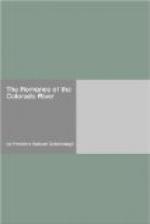them what he had learned of Cibola, and that, as Coronado
might now have been informed by natives of his presence,
he hoped to find means of reaching him. There
was much objection to this plan, but he proceeded
to carry it out, taking all three boats this time,
loaded with “wares of exchange, with corn and
other seeds, with hens and cocks of Castile.”
This region he called the Province of Campanna de
la Cruz, and he left orders for the building of an
oratory or chapel to be named the Chapel of Our Lady
de la Buena Guia. The river he called the Rio
de Buena Guia (good guidance) from the motto on the
viceroy Mendoza’s coat of arms. It was
Tuesday, the 14th of September, when he started, taking
with him Nicolas Zamorano, chief pilot, to record
the latitudes. He soon arrived again among the
Quicomas,* and then among the Coamas, where he found
his man who had been left behind on the first trip.
This man had been so well treated that he was entirely
content to remain till the party should come back
down the river. This was the highest point reached
on the first visit. Everywhere the people were
treasuring the crosses which had been given them,
kneeling before them at sunrise. Alarcon kept
on up the river till he “entered between certain
very high mountains, through which this river passeth
with a straight channel, and the boats went up against
the stream very hardly for want of men to draw the
same.” From this it may be inferred that
the Coamas did not strive with each other for the
privilege of towing the boats of these children of
the sun as those below had done. Now an enchanter
from the Cumanas tried to destroy the party by setting
magic reeds in the water on both sides, but the spell
failed and the explorers went on to the home of the
old man who had been so good a friend and guide to
them. At this, Alarcon’s farthest point,
he caused a very high cross to be erected, on which
words were carved to the effect that he had reached
the place, so that if Coronado’s men chanced
to come that way they might see it. Nothing is
said about burying letters, yet Diaz later mentions
finding letters buried at the foot of a tree, apparently
nearer the sea. Deciding that he could not at
this time accomplish his purpose of opening communication
with the army, Alarcon concluded to return to the
ships, but with the intention of trying once more.
The second day after starting down he arrived at the
place where the Spaniard had remained. He told
him that he had gone “above thirty leagues into
the country” beyond. It had taken him,
before, two and a half days to reach the river mouth
from here, so that it seems he was about four days
going down from his farthest point. Roughly estimating
his progress at six miles an hour for twelve hours
a day, in four days the distance covered would be
about 288 miles. He says he went up eighty-five
leagues (this would be fifty-five the first time and
thirty more the second), which, counting in Mexican
leagues of two and three quarter miles each, gives




